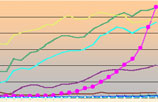China's towering metal stockpiles cast economic shadow
(Agencies) Updated: 2012-05-25 17:54When metals warehouses in top consumer China are so full that workers start stockpiling iron ore in granaries and copper in car parks, you know the global economy could be in trouble.
At Qingdao Port, home to one of China's largest iron ore terminals, hundreds of mounds of iron ore, each as tall as a three-storey building, spill over into an area signposted "grains storage" and almost to the street.
Further south, some bonded warehouses in Shanghai are using carparks to store swollen copper stockpiles - another unusual phenomenon that bodes ill for global metal prices and raises questions about China's ability to sustain its economic growth as the rest of the world falters.
Commodity markets are used to seeing China's inventories swell in the first quarter, when manufacturing slows down due to the Lunar New Year holidays, and then gradually decline during the second quarter when industrial activity picks up.
This year, however, is different.
Copper stocks in Shanghai's bonded storage, the biggest in China, are now double the 300,000 metric tons (330,693 tons) average of the past four years and iron ore stocks are about a third more than their 74 million metric tons average.
China is the world's biggest buyer of industrial metals, which are then manufactured for domestic use or exported to the rest of the world.
Several euro zone economies are in recession and there are serious fears about the solvency of several more. The United States, the world's biggest economy, is sputtering along, with a recovery just out of reach.
Then there's China itself, where the economy is still growing, but at a significantly slower pace. Economists keep predicting the slowdown will end soon, but it's hard to see how when the rest of the world appears headed for the doldrums.
"New orders have slowed quite substantially from a year ago," said a manager at a large copper tube factory who declined to be named as he was not authorized to speak to the media.
"With demand so weak, we've scaled back operations, shut one production line and reduced the number of shifts."
The slowdown has hit hard some of the small and medium-sized manufacturers and traders who form the bulk of China's metals business. Some steel traders have committed suicide and owners of faltering factories have skipped town to escape creditors, according to local media reports over the past year.
This week, the world's biggest miner, BHP Billiton (BHP.AX) (BLT.L), said it was putting on hold a China-centric plan to spend $80 billion over the next five years to expand its iron ore, coal, energy and base metals divisions.
In his most cautious comments yet, BHP Chairman Jacques Nasser also said he expected commodity prices to cool further and that investors had lost confidence in the global economy.
"We should pause, take a deep breath and wait and see where the pieces fall around the world," he said.
Misreading the market
China's refined copper imports have surged over 70 percent so far this year to 1.1 million metric tons, while demand from Chinese manufacturers was forecast to rise by up to 7 percent. Meanwhile, iron ore shipments have risen 6 percent, with traders reckoning that local demand growth is much lower.
Copper is used in housing and appliances and iron ore is the raw material for steel.











